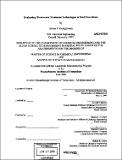Evaluation wastewater treatment technologies at Ford Powertrain
Author(s)
Gaslightwala Abizer F. (Abizer Firoze), 1973-
DownloadFull printable version (6.242Mb)
Other Contributors
Massachusetts Institute of Technology. Dept. of Chemical Engineering.
Advisor
Arnold I. Barnett and Charles L. Cooney.
Terms of use
Metadata
Show full item recordAbstract
In preparation for an upcoming EPA proposal regarding Free Oil & Grease (FOG) and metal ion content in wastewater effluent, a study was performed for Ford Motor Company that assesses various seconctary wastewater treatment technologies. The three water purification technologies, membrane filtration, biological treatment, and clay media adsorption, were evaluated as secondary water treatment solutions for oily wastewater. Three different types of membrane technologies were tested: polymeric, ceramic, and sintered stainless steel. In regards to FOG, the membrane technologies and the clay media were able to reduce FOG levels below the EPA proposal of 17 mg/L. However, the clay media did not show a strong affinity for metal ions. The membrane technologies were 'lble to reduce all iron levels below the recommended limits (1.3 mg/L). However, they were not able to reduce aluminum below the proposed limit (I mg/L). This implies that additional downstream processing would be required to remove the aluminum if the membrane solution was implemented and the regulation passes as proposed. The biological wastewater treatment was not tested during these trials, but was assumed to be able to meet all FOG and metal requirements proposed by the EPA. Based on these experimental results and basic design assumptions, an economic analysis over a ten-year period indicated that the biological waste treatment system was the lowest in costs, followed by the polymeric membranes. The estimated installed and operating costs for both technologies was $800,000 and $1,200,000 respectively. The nearest alternative solution, the stainless steel membranes, was over 200% more expensive than the lowest cost option. Based on this economic analysis, Ford should pursue additional research and experiments into the feasibility of using biological wastewater treatment to meet EPA proposed regulations. More specifically, experiments should be conducted to help verify the assumptions used and economic results obtained in this study. As a secondary option, in the absence of additional data, polymeric membranes are recommended as the best solution, despite additional processing needed to remove aluminum ions from water effluent. In addition, the biological waste treatment option has the potential to reduce chemical oxygen demand (COD) measurements below the levels seen by any of the membrane technologies. None of the membrane technologies investigated were capable of reducing COD levels below 200 mg/L on a consistent basis, thus indicating that this might be a fixed barrier for these technologies. Although not relevant today, COD measurements might have significant importance in future EPA water regulations, and should be taken into account when recommending a treatment solution.
Description
Thesis (S.M.)--Massachusetts Institute of Technology, Dept. of Chemical Engineering; and, (S.M.)--Massachusetts Institute of Technology, Sloan School of Management, 2000. Includes bibliographical references (p. 80).
Date issued
2000Department
Massachusetts Institute of Technology. Department of Chemical Engineering; Sloan School of ManagementPublisher
Massachusetts Institute of Technology
Keywords
Sloan School of Management., Chemical Engineering.